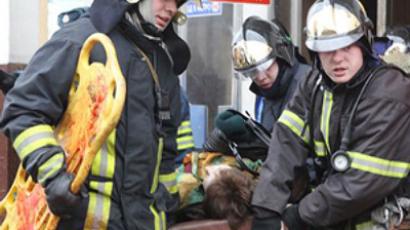ROAR: New federal district “almost formed” as North Caucasus violence continues

The formation of the North Caucasus Federal District is coming to an end, Russia’s presidential envoy has said, but security remains the region’s unsolved problem.
The district located in the southwest of Russia and populated by almost nine million people was created by the Russian president on January 19. It was split from the Southern Federal District and comprises the republics of Dagestan, Ingushetia, Kabardino-Balkaria, Karachayevo-Cherkessia, North Ossetia, Chechnya and Stavropol Region.
Aleksandr Khloponin, the presidential envoy in the district and former Krasnoyarsk Region governor, also retains the position of Deputy Prime Minister.
The Russian government is expected to adopt a resolution on Friday, prepared by Khloponin, to create a special administrative system in the district. It will work in the framework of the federal organs of executive power.
Khloponin may receive additional authorities. In particular, he will be able to initiate dismissals of officials who do not fulfill their duties properly, the media say.
The formation of the district’s administrative structure is being completed, Khloponin said, presenting General Sergey Chenchik as the district’s police head in Pyatigorsk on May 13. The appointment of Chenchik will make it possible to strengthen law and order in the region, the envoy said.
The district’s leadership and police should first of all guarantee security for people who live there and come to the region, Khloponin said. Security, fighting terrorism and corruption are the main tasks of the regional authorities, he stressed.
Interior Minister Rashid Nurgaliev, in his turn, said during the same ceremony he was concerned about “the growth of terrorist manifestations in the North Caucasus.” The situation in the region influences the inner political situation in Russia,” he stressed.
“Economic development of the North Caucasus implies security for citizens of the district,” Nurgaliev said. However, he admitted that the number of terrorist acts has grown in recent months.
Appointing Chenchik should guarantee more professional approach in fulfilling security tasks in the region, Nurgaliev noted. Chenchik has worked in the region for 14 years and knows its traditions.
Chenchik told reporters he had begun “to form a collective that will be able to fulfill the tasks set by the country’s leadership.”
During his visit to the Republic of Dagestan in April, President Dmitry Medvedev said that the measures to fight terrorism “should be expanded, they should be more effective, more harsh, more cruel.”
However, analysts do not expect quick results. Moreover, recent attacks against officials only confirm Nurgaliev’s concerns. Since the beginning of the year, the Interior Ministry lost 26 police officers in the North Caucasus, he said.
Attacks against regional officials also continue. On May 12, Fral Shebzukhov, advisor to the president of Karachayevo-Cherkessia was gunned down in the republic’s capital Cherkessk. He was thought to be a candidate for the republic’s prime minister.
Karachayevo-Cherkessia president Boris Ebzeev was the first new head of a republic in the North Caucasus appointed by Medvedev in summer 2008, Vremya Novostey daily said. The republic has remained in permanent political crisis since 2004 because of the split in the ruling Karachay elite, the paper noted.
Meanwhile, many Cherkessians, a minority group in the republic, complain that they are not represented properly in the organs of power.
On the eve of the May holidays, Ebzeev dismissed the government. Prior to this move, Khloponin visited the republic and ordered the appointment of an ethnic Cherkessian to the head of government. The federal center may have found in this the key to easing tensions between the Karachays and the Cherkessians, the paper said.
Shebzukhov could have been nominated to the post of the prime minister, but the republic’s presidential administration said others were also considered. However, Shebzukhov was not a political leader, and politically active Cherkessians do not consider the attack as “another act of aggression against their ethnic group,” the paper said.
So far it is unclear who had organized the attack, but those interested in “aggravating the problem of interethnic relations in the republic might have been involved,” the daily noted.
Khloponin describes the North Caucasus as Russia’s strategic territory, Kommersant daily said. Certain forces are interested in inciting disagreements between ethnic groups, the envoy said while visiting Karachayevo-Cherkessia.
“Whole institutions” are working to create the so-called Cherkessian problem, he noted. “Big banks or serious corporations will not do anything until the republic has the main thing – political stability,” the envoy added.
Khloponin also explained the position of the federal center, the paper noted. “The answer to your recourses will be one – first come to an agreement, put things in order, and then we will speak with you,” he said.
At the same time, the federal authorities are trying to develop new strategy for the North Caucasus. A special group of analysts and investment specialists should present the program by the end of June.
However, first proposals of the new district’s leadership have already been announced. “Practically every day federal officials and regional leaders in the North Caucasus state that one of the keys to overcome the difficult situation in this southern Russian region is fighting unemployment,” Vremya Novostey said.
Prior to the May holidays Khloponin proposed to form working groups from the unemployed in the North Caucasus and send them to other Russia’s regions, even if temporarily, the paper said.
The region remains the only Russian territory where a growth of population is observed instead of demographic decline, the paper noted. This creates a pressure on the whole system of social and economic relations in the conditions of the economic depression the region has been going through since the end of 1980s, it added.
However, a certain risk exists that the idea of labor migration from the North Caucasus will generate “a bulky and expensive bureaucratic machine” that will bring, among other things, more conflicts in the receiving regions, the paper said.
Sergey Borisov,
Russian Opinion and Analysis Review













